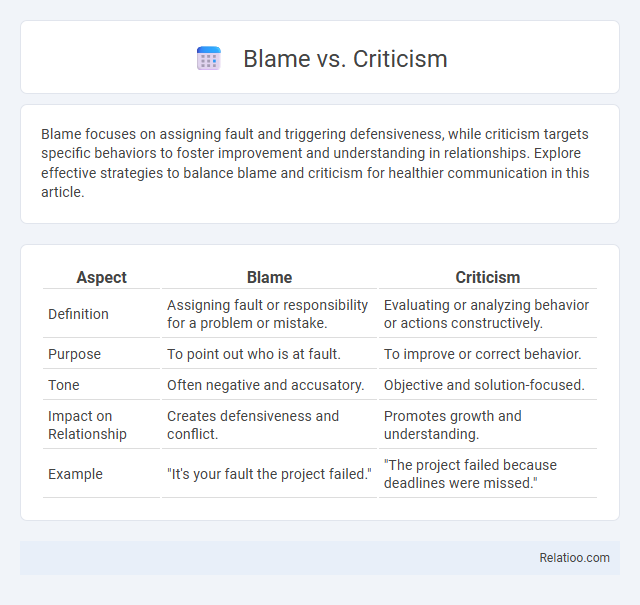Blame focuses on assigning fault and triggering defensiveness, while criticism targets specific behaviors to foster improvement and understanding in relationships. Explore effective strategies to balance blame and criticism for healthier communication in this article.
Table of Comparison
| Aspect | Blame | Criticism |
|---|---|---|
| Definition | Assigning fault or responsibility for a problem or mistake. | Evaluating or analyzing behavior or actions constructively. |
| Purpose | To point out who is at fault. | To improve or correct behavior. |
| Tone | Often negative and accusatory. | Objective and solution-focused. |
| Impact on Relationship | Creates defensiveness and conflict. | Promotes growth and understanding. |
| Example | "It's your fault the project failed." | "The project failed because deadlines were missed." |
Understanding Blame and Criticism: Key Differences
Blame involves assigning responsibility for a fault or wrong, often leading to defensiveness, while criticism focuses on evaluating actions or behaviors with the intent to improve. Understanding the key differences between blame and criticism helps you respond constructively rather than react emotionally. Recognizing that blame targets the person, whereas criticism targets the issue, enables more effective communication and conflict resolution.
The Psychology Behind Blaming and Criticizing
The psychology behind blaming and criticizing reveals distinct emotional triggers and cognitive processes; blame often arises from a need to deflect responsibility and protect self-esteem, while criticism involves evaluating behavior or decisions to promote improvement. Research in social psychology indicates that blame can lead to defensive reactions and hinder problem-solving, whereas constructive criticism fosters self-awareness and growth. Understanding these dynamics aids in developing healthier communication strategies that minimize conflict and enhance interpersonal relationships.
How Blame Impacts Relationships
Blame often damages relationships by creating defensiveness and eroding trust, leading to communication breakdowns and emotional distance. Unlike constructive criticism, which aims to improve behavior with specific feedback, blame assigns fault and fosters resentment, making resolution difficult. Your ability to address issues without blame can strengthen connections and promote a healthier, more supportive dynamic.
The Consequences of Excessive Criticism
Excessive criticism can damage your self-esteem and hinder personal growth by creating a fear of failure and reducing motivation. Unlike blame, which targets responsibility, or constructive feedback, which aims to improve, constant negative criticism fosters resentment and anxiety. Understanding these distinctions helps you manage interpersonal relationships more effectively and promotes a healthier communication dynamic.
Blame vs Criticism in Workplace Dynamics
Blame in workplace dynamics often targets individuals as the source of a problem, creating defensiveness and strained relationships, while criticism focuses on specific behaviors or outcomes, promoting constructive feedback and growth. Understanding the distinction between blame and criticism is crucial for fostering a productive work environment where solutions are prioritized over fault-finding. Your ability to give and receive criticism effectively can improve team collaboration and overall performance.
Constructive Criticism: Turning Feedback into Growth
Constructive criticism differs from blame and harsh criticism by focusing on specific behaviors rather than personal faults, fostering a growth-oriented mindset. Your ability to receive and apply constructive feedback encourages continuous improvement, strengthens relationships, and enhances problem-solving skills. Emphasizing solutions and actionable steps in feedback transforms potential conflicts into opportunities for development.
Blame Culture: Effects on Team Performance
Blame culture creates a toxic environment where team members fear taking risks and learning from mistakes, leading to reduced collaboration and innovation. Your team's performance suffers as individuals focus on avoiding fault instead of solving problems, resulting in decreased productivity and morale. Overcoming blame culture requires fostering trust, accountability, and open communication to encourage growth and collective success.
Navigating Blame and Criticism in Conflict Resolution
Blame often assigns fault and creates defensiveness, while criticism points out specific behaviors that can be changed, fostering constructive dialogue. Navigating conflict requires recognizing the difference to avoid escalating tension and instead promote understanding and resolution. Your ability to focus on behavior rather than personal attack facilitates clearer communication and more effective problem-solving in conflicts.
Strategies to Replace Blame with Productive Dialogue
Blame often creates defensiveness, while criticism can focus on specific behaviors without attacking character, and accountability encourages responsibility without judgment. Strategies to replace blame with productive dialogue include using "I" statements to express feelings, focusing on solutions instead of assigning fault, and actively listening to understand the other person's perspective. Your efforts to foster open communication and empathy lead to more constructive outcomes and stronger relationships.
Building Positive Communication: Minimizing Blame and Criticism
Effective communication in relationships hinges on minimizing blame and criticism, as both can damage trust and create defensiveness. Emphasizing constructive feedback and using "I" statements fosters understanding and collaboration, encouraging positive dialogue and problem-solving. Building positive communication environments leads to increased empathy, stronger connections, and healthier interpersonal dynamics.

Infographic: Blame vs Criticism
 relatioo.com
relatioo.com